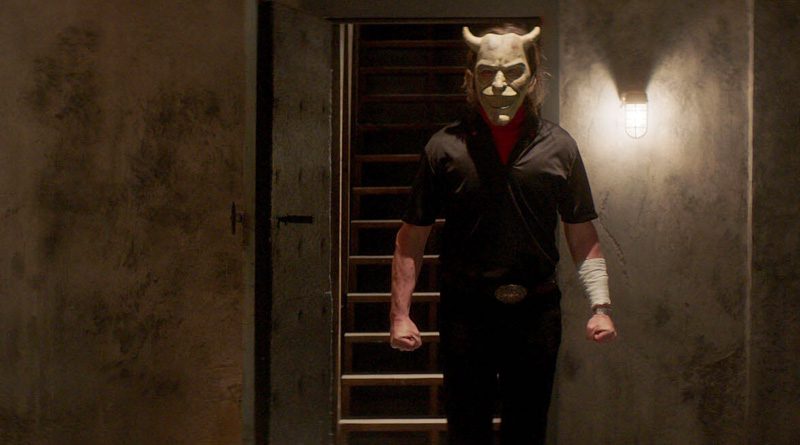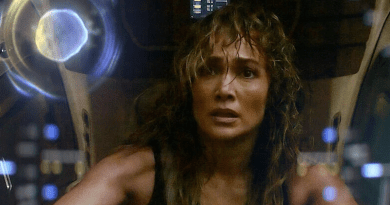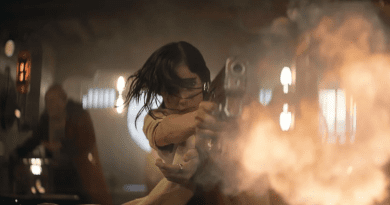The Black Phone (2022) Review
Once upon a time, Scott Derrickson was supposed to direct Doctor Strange sequel — Doctor Strange in the Multiverse of Madness, that is –but he chose to depart the project due to creative differences. Instead, he returns to his familiar small-scale horror-movie territory in The Black Phone, where he reunites with Ethan Hawke after previously working together in Sinister back in 2012.
Adapted from Joe Hill’s short story of the same name, the movie takes place in Denver in 1978, where a mysterious serial killer nicknamed “The Grabber” (Ethan Hawke) drives a van full of black balloons and has been abducting five kids so far. 13-year-old Finney (Mason Thames) becomes the latest victim while on his way back home from school. The Grabber ends up locking him in a dingy basement with only a mattress, a bathroom and a disconnected black rotary dial phone on the wall.
With no way out and the basement being soundproof, it all seems hopeless until Finney is surprised to find the phone rings. He answers the phone and begins talking to The Grabber’s victims.
The local police led by Detective Wright (E. Roger Mitchell) and Detective Miller (Troy Rudeseal), in the meantime, are trying to gather whatever info and clues they can get to locate Finney and the rest of the missing children. The detectives, particularly Wright even turn to Finney’s younger sister, Gwen (Madeleine McGraw) for help.

The kind of help that made me question the way a detective works on a case. Like, how is it acceptable to see a detective would believe a clue based on… Gwen’s dreams? Okay, so we learn that Gwen somehow has psychic powers of sorts but her ability is rather introduced superficially. I’m not sure whether this is meant to satirise how dumb a cop could be in a horror genre but even let’s say Derrickson tries to inject some black-comedy elements here, the result remains truly baffling. Blame it on the way Derrickson shaped his movie into an uncompromisingly grim 1970s-style horror thriller and his overall mean-spirited tone just doesn’t fit well with the added comedy.
The Black Phone also shoehorned a subplot that introduces an unnecessary comic relief played by James Ransone. Scenes involving Finney talking to different victims over the phone become repetitive after a while and at one point, unintentionally laughable. It also doesn’t help when Derrickson includes some random jump scares and awkwardly-misplaced supernatural elements related to The Grabber’s victims.
Then, there’s Ethan Hawke. I was expecting a lot from his cast-against-type performance as The Grabber. While I love the legendary Tom Savini-created devil mask that he wears in the movie, his otherwise potentially sinister role comes across as a weak antagonist. I understand that element of fear of the unknown is incorporated into his character, where we learn nothing about his past except for the fact he’s pure evil through and through.

But no matter how hard he tries to look menacing or sounds creepy the whole time, his character is hardly scary and frightening. This turns out to be a pity because Ethan Hawke’s The Grabber immediately reminds me of Pennywise in Stephen King’s It since both of them are vicious antagonists who abducted children in the small town. Of course, this influence is obvious, given the fact that Joe Hill is the son of Stephen King.
The Black Phone isn’t entirely a disaster, though. There are some elements that I like in this movie. Derrickson deserves credit for setting up the story of how Finney has to deal with school bullies and his abusive father (Jeremy Davies in a solid supporting turn), who spends time drinking at home. He also develops a strong bond with his tough younger sister, Gwen and their on-screen sibling relationship works well due to Mason Thames and Madeleine McGraw’s great chemistry as well as their engaging performances.
Given the grim nature of the movie, Derrickson knows well how to craft both tense and violent moments (scenes involving domestic abuse and kids-related violence come to mind).
So much for the missed opportunity that The Black Phone could have been a great horror thriller. Now, if only Derrickson would choose to play it straight without throwing in some misplaced comedy and supernatural elements.





